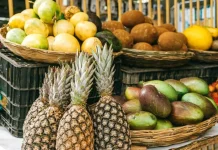Achieving and maintaining a healthy weight is essential for overall well-being and reducing the risk of various health conditions. Healthy weight loss involves making sustainable lifestyle changes that promote gradual and long-term results. Regular physical activity and adopting healthy habits, you can reach your weight loss goals safely and effectively by implementing a balanced diet.
Here Are The Ultimate Guide to Effective Weight Loss
Set Realistic Goals
Start your weight loss journey by establishing realistic and attainable goals. Focus on achieving gradual and sustainable progress rather than pursuing rapid weight loss. This approach ensures long-term success and reduces the risk of weight regain.Adopt a Balanced Diet
Direct your attention towards consuming a balanced diet that incorporates a variety of nutrient-dense foods. Ensure your diet consists of ample fruits, vegetables, whole grains, lean proteins, and healthy fats. It is advisable to restrict the intake of processed foods, sugary beverages, and high-calorie snacks.Regular Physical Activity
Participate in regular physical activity to burn calories and enhance overall fitness levels. Aim for at least 150 minutes of moderate-intensity aerobic exercise per week with strength training exercises to build lean muscle mass.Stay Hydrated
Stay hydrated by consistently drinking an adequate amount of water throughout the day. Water aids in suppressing appetite, boosting metabolism, and facilitating digestion. Choose water as your primary beverage, and steer clear of sugary drinks.Don’t Skip Meals
Skipping meals often leads to excessive hunger, which can result in overeating unhealthy food choices later in the day. Eating balanced meals and snacks helps regulate your appetite and prevent cravings.Eat Slowly
By eating slowly and practicing mindful eating, you can experience the benefits of effective weight loss. Savoring each bite and paying attention to your body’s cues will enhance portion control, digestion, and overall meal satisfaction.Limit Your Food
Be mindful of portion sizes to avoid overeating. Opt for smaller plates and bowls and pay attention to your body’s hunger and fullness cues. Avoid eating in front of screens, which can contribute to mindless eating.Get Adequate Sleep
Prioritize getting enough quality sleep each night. Ensure you get 7-8 hours of uninterrupted sleep per night, as lack of sleep can disrupt hormone levels associated with hunger and satiety, potentially leading to increased cravings and overeating.Seek Support
Build a supportive network of friends and family, or join a weight loss community to surround yourself with encouragement and assistance on your weight loss journey. Share your goals and challenges, and seek encouragement and accountability. Consider working with a registered dietitian or weight loss coach for professional guidance.Practice Self-Care
Take care of your mental and emotional well-being. Effectively manage stress by incorporating relaxation techniques like meditation or yoga into your daily routine. Engage in activities you enjoy, practice self-compassion, and celebrate your success.
Final Words
Weight loss involves more than just a number on the scale; it’s about embracing a healthier lifestyle that can sustain over the long term. Celebrate your progress, stay motivated, and embrace the positive changes for a happier and healthier life. Remember, the goal is to create sustainable habits that contribute to overall well-being rather than focusing solely on short-term results. By recognizing and prioritizing your health and making gradual, positive changes to your diet and physical activity, you’re laying the foundation for long-lasting success.
Frequently Asked Questions (FAQs)
Can eating slowly really help with weight loss?
Yes, slow eating can aid weight loss by allowing your body to recognize feelings of fullness, preventing overeating.
Is it necessary to count calories when practicing healthy weight loss?
While counting calories can be helpful for some, focusing on overall food quality, portion control, and mindful eating is often more sustainable and effective.
Should I avoid any specific foods for weight loss?
Including nutrient-dense, whole foods in your diet offers more benefits than fixating on specific foods to avoid. Choose balanced meals and limit processed and sugary foods.
Can drinking water help with weight loss?
Yes, drinking water can support weight loss by promoting hydration, reducing calorie intake, and boosting metabolism. Aim for adequate daily water intake.
Should I skip meals to lose weight?
Skipping meals is not recommended approach for achieving healthy weight loss. It is essential to prioritize regular and balanced meal consumption and snacks to maintain a stable metabolism and ensure adequate energy levels. You can support your weight loss journey effectively and sustainably by nourishing your body consistently throughout the day.











